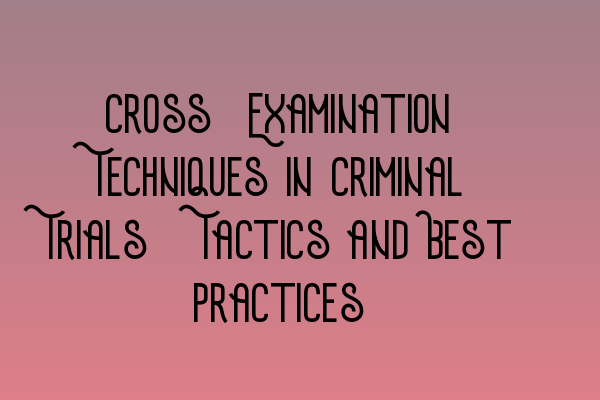Cross-Examination Techniques in Criminal Trials: Tactics and Best Practices
Welcome to SQE Criminal Law & Practice Law UK, the leading authority on legal education and practice. In this blog post, we will delve into the crucial topic of cross-examination techniques in criminal trials. Effective cross-examination is the art of questioning witnesses to elicit favorable evidence and undermine the credibility of opposing witnesses. It requires a combination of strategic thinking, quick wit, and deep legal knowledge. Mastering cross-examination techniques can greatly impact the outcome of a criminal trial.
The Importance of Cross-Examination in Criminal Trials
Cross-examination is a fundamental part of the adversarial system, allowing the defense to challenge the prosecution’s case and probe inconsistencies in witness testimony. It provides an opportunity to uncover the truth, expose bias, and create doubt in the minds of the jurors. A well-executed cross-examination can unravel the opposing party’s case and turn the tide in favor of the defense.
Tactics and Best Practices
To conduct an effective cross-examination, it is essential to employ tactics and best practices that can maximize the impact of your questioning. Here are some key strategies to consider:
- Know Your Case: Before cross-examining a witness, thoroughly familiarize yourself with the facts of the case, the witness’s role, and their statements. This will allow you to identify weaknesses and inconsistencies in their testimony.
- Prepare a Comprehensive Plan: Outline your cross-examination strategy, including the points you want to emphasize, the sequence of questions, and any potential objections. A well-structured plan will keep you focused and prevent missed opportunities.
- Control the Witness: Take charge of the cross-examination by setting the pace and tone of questioning. Through careful phrasing and framing, guide the witness towards the answers that support your case.
- Use Leading Questions: Utilize leading questions to elicit specific answers and direct the witness’s attention to the crucial details that favor your argument. Leading questions often start with words like “isn’t it true that” or “didn’t you say.”
- Listen Actively: Pay close attention to the witness’s responses and adapt your questioning accordingly. Actively listen for inconsistencies, contradictions, and opportunities to challenge the witness’s credibility.
- Employ Impeachment Techniques: If the witness’s credibility is questionable, use impeachment techniques to undermine their testimony. This can involve introducing prior inconsistent statements or highlighting biases, interests, or motives that may affect their reliability.
These tactics, when applied strategically, can be powerful tools in demonstrating reasonable doubt or casting doubt on the prosecution’s case. It is essential to practice and refine your cross-examination skills to ensure a compelling and persuasive courtroom performance.
Further Resources
For those preparing for the SQE 1 or SQE 2 exams, SQE Criminal Law & Practice Law UK offers an array of comprehensive preparation courses. These courses are designed to equip candidates with the knowledge and skills necessary to excel in their exams. To enhance your preparation, we also recommend checking out the following resources:
- SQE 1 Practice Exam Questions
- SQE 1 Practice Mocks FLK1 FLK2
- SQE 2 Preparation Courses
- SQE 1 Preparation Courses
- SRA SQE Exam Dates
We hope you found this blog post informative and insightful. Effective cross-examination is an essential skill for criminal practitioners, and by honing your techniques, you can greatly enhance your chances of success in the courtroom. For more articles and resources related to criminal law and practice, visit SQE Criminal Law & Practice Law UK.
